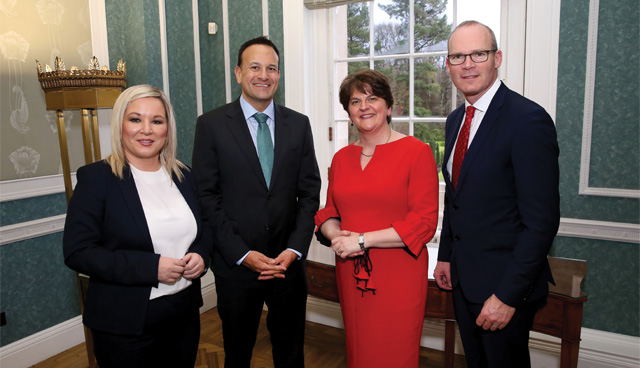New Decade, New Approach

In January, over three years of stalemate in the North’s devolved institutions
were ended after a draft deal published by the British and Irish Government representatives effectively bounced parties into reforming an Executive, writes David Whelan.
The decision by the British and Irish representatives to publish a draft deal ahead of a deadline, which would have seen the likely return to full direct rule of the North from Westminster, was enough to push the parties to renege on previously held red lines.
Remarkably, the five major parties in Northern Ireland all agreed to reform an Executive without any concrete commitments as to the funding that would underpin the wide-ranging priorities, spanning almost every sector.
In the end, the £2 billion financial package (£760 million of ‘new’ money) announced by the British Government fell way short of expectations at Stormont of funding required to adequately implement the deal’s priorities.
Questions have already been raised about the feasibility and ambiguity around some of the objectives included. For example, reducing hospital waiting lists and resolving ongoing industrial disputes with public sector workers were obvious priorities. On the other hand, commitments to “support educating children and young people of different backgrounds together” or “develop a regionally-balanced economy with opportunities for all” lack detail, defined benchmarking and financial arrangements for achievement.
Commitments
Annex B of the agreement is dedicated specifically to the Irish Government’s commitments within the deal. The majority of these centre on the full restoration of the institutions created by the Good Friday Agreement. This includes not only the Strand One institutions of the Assembly and the Executive in Northern Ireland, but also the North-South and East-West institutions of strands two and three, many of which have deteriorated into obscurity since the Agreement was signed in 1998.
A number of the commitments relate to the reestablishment of the North South Ministerial Council to examine a range of issues spanning Brexit to parliamentary relationships. However, herein lies a challenge. Historically, unionism in Northern Ireland has been weary of North-South cooperation and the DUP have previously questioned the need for the existence of the Council. In 2010, now Agriculture Minister Edwin Poots questioned the need for face-to-face talks with his Irish counterparts, suggesting an electronic alternative.
Input by the Irish Government on matters relating to the North are often given the cold shoulder by the DUP. As recently as 2018, Arlene Foster described the British-Irish Intergovernmental Conference, which was restored in the absence of the Assembly, as a “talking shop”. Regular meetings of the conference are another key commitment of the Irish Government within the new deal.
Whether the DUP will fully engage in and with these institution remains to be seen but doubts exist about their own commitment. Input into the ambitions by the Irish Government to resume discussions with the Executive on corporate planning guidance for the North-South bodies will be a telling in this regard.
Funding levels within the deal are ambiguous but the Government does commit to three years of additional funding to the Irish Language Broadcasting Fund and to development of Irish Language Networks.
Announced package: £2 billion
Funding provided regardless of New Decade New Approach: £1 billion
Funding provided from undrawn Confidence & Supply: £240 million
New funding: £760 million
Source: Department of Finance
Worth noting is the fact that the Government, which signed up to funding pledges, has dissolved. While most of the pledges are likely to be adopted by a new government, a commitment “in principle” to significant new funding for the International Fund for Ireland (IFI) and maintained funding of €3.7 million annually to the Reconciliation Fund, will have to be factored into future budgetary decisions.
Infrastructure
Unlikely to be affected are the infrastructure and connectivity priorities outlined in the 10-year National Development Plan (NDP). The deal sees the Irish Government pledge to “update and enhance” its commitment to cross-border investment. While many of the projects name-checked are in existing areas of co-operation, previously outlined in the NDP, the deal does outline a desire to increase the expediency of delivery of the A5 road and the Ulster Canal connection from Clones to Upper Lough Erne.
Interestingly, while there is no firm financial commitment or associated timeline, the previous Government moots the possibility of discussions on a spine of connectivity on the island through high-speed rail connection between Belfast, Dublin and Cork, “which could be progressed as a priority”. Similarly, the Government expressed an intention to review potential Government support for “renewed viable air routes from Cork to Belfast and Dublin to Derry”. Other significant projects suggested include greenways in border areas, such as that of the Sligo-Enniskillen Greenway.
In addition, the Government has committed to introducing necessary legislation in the Oireachtas to support the establishment of the Stormont House Agreement legacy institutions.
Outside of the Government’s commitments but embedded in the deal is a rule change by the UK Government around how people in Northern Ireland can bring their family members to the UK. The change was prompted by the well-publicised case taken by Emma de Souza regarding citizenship and the right to identify as an Irish citizen without renouncing an unacknowledged British citizenship. The law change relates directly to de Souza in that she can now apply for UK immigration status for her husband on broadly the same terms as the family members of Irish citizens in the UK. However, while the change should rectify the de Souzas’ personal case and cases similar to that, it fails to address the wider citizenship issues highlighted by the case.
The UK Government has not legislated for the implementations of the birth right provisions within the Good Friday Agreement within UK domestic law. This means that questions remain as to what further rights restrictions for those identifying as Irish citizens in Northern Ireland, a key tenet of the Good Friday Agreement, will exist post-Brexit.





